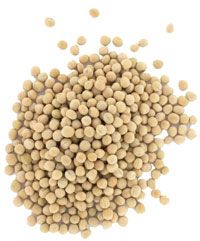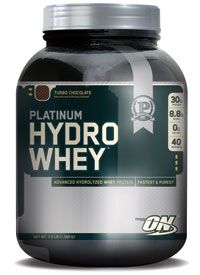Creatine Does More Than Rock Your Bod

Creatine monohydrate (Cn) supplements rake in hundreds of millions of dollars, every year. If you aren't buying the pills or the powders (creatine plus a water molecule), you're still getting creatine from red meat, seafood, or its natural production in the human bones. For years, athletes have been exploiting its powers for longer, more-intense workouts, and bigger muscles to boot.
Accordingly, the supplement industry loves it, too. "Cn has had a stronghold in the industry since its arrival on the scene over 10 years ago," says Jason Provenzano, executive vice president of sales and operations for Nutricap Labs (Farmingdale, NY). "It's popular because of fast results, it's relatively inexpensive, and it's easy to flavor."
Creatine is a combination of amino acids (arginine, glycine, and methionine) most notably responsible for increasing and regenerating adenosine triphosphate (ATP) levels in human cells. Increased ATP translates into increased human energy. More energy can provide for longer workouts, which can mean bigger, bulkier muscles. That's a nice start.
"Of the thousands of studies out there, I'd say that 90% just look at muscle mass and strength," says Darren Candow, PhD, professor of kinesiology and health studies at the University of Regina in Saskatchewan, Canada. "But in recent years, we've seen a shift."
Researchers around the globe are now exploring Cn as more than a way to merely rock your bod. Here is a look at a few scientific breakthroughs that may have other people considering Cn.
NEW WHEYS TO WORK OUT

WHILE POSITIVE SIGNS point toward creatine monohydrate as a reputable sports nutrition supplement, the benefits of other nutrients should not go without praise. Whey is as much a champion of the fitness industry as is creatine. Darren Candow, PhD, is a creatine researcher and professor of kinesiology and health studies at the University of Regina in Saskatchewan, Canada. Candow, who regularly incorporates whey into his strength-training studies with creatine, says whey is a proven substance for its role in muscle recovery.
And this protein has been getting a face change. For the last few years, bodybuilding supplement companies have been releasing whey isolate supplements. Whey isolates are prepared differently from standard whey in that all lactose gets removed in the process. It's a whey for lactose intolerants, and it's a whey without the gassy side effects.

This fall, Optimum Nutrition (Aurora, IL) released its Platinum Hydrowhey, a lactose-free hydrolyzed whey powder. The company claims that hydrolyzing the protein breaks it down into smaller pieces that get to the body quicker. After years of research and reformulating, Optimum Nutrition believes that its Hydrowhey is the first of its kind that doesn't have the standard bitter taste typical of whey isolate products.
Another recent innovation in protein isolates comes from A&B Ingredients (Fairfield, NJ), which just released Pisane, a nongenetically modified pea protein isolate extracted from the yellow pea (Pisum sativum). Meant for sports nutrition and all-around protein needs, Pisane offers a new, innovative way to get the necessary protein intake for sports performance.
Bones over Brawn
Under our muscles, Cn may actually strengthen the bones that take a beating from years of growth and physical exercise.
A study published in last fall's Medicine and Science in Sports and Exercise found that older men who supplemented with a low dose of Cn before resistance training saw multiple physical improvements. Aside from expected gains in body mass and muscle thickness, a significant factor in bone strength was improved.
Cross-linked N-telopeptide (NTx) levels were reduced by 27% with Cn supplementation, compared with a 13% increase in NTx levels with placebo. NTx is a product that results from collagen breakdown in bones, which occurs from normal human growth and sustainment of injuries. NTx also happens to be a strong marker of osteoporosis, so Cn's ability to lower NTx could be a plus for those suffering from this bone disease.
A body can go a long way with strong bones. "If we can increase the strength in the bone, of course that will increase muscle," says Candow, a researcher in the study. "But this could allow older people, especially, to live longer and exercise longer, free of bone disease."
"One can expect that elderly people will be most benefited by Cn," says Brazilian researcher Bruno Gualano, who published an extensive scientific review on Cn in March's Amino Acids journal. "After all, they are most prone to muscle weakness, osteoporosis, osteoarthritis, and mental disabilities, all of which may be quelled by Cn."
Several other bone studies are investigating Cn as a possible therapeutic aid to mineral breakdown in bones. Candow and his colleagues are even preparing for an upcoming yearlong study that they hope will shed light on other bone issues related to bone mineral, lean tissue mass, and muscle hypertrophy.
Neurodegenerative Diseases
Bone health is a serious concern for aging athletes, but cognitive functions are equally vulnerable in the latter stages of human growth. Could Cn have a positive effect here? Quite possibly.
Research suggests that diseases related to the central and peripheral nervous system-including (but not limited to) Parkinson's disease, Huntington's disease, and Amyotrophic lateral sclerosis-may also find a friend in Cn.
Energy depletion, mitochondrial dysfunction, and antioxidative stress are key factors involved in these types of disorders. Scientists believe that Cn can positively affect each of these symptoms. (How it performs some of these novel functions is still a mystery.)
"The National Parkinson Foundation (NPF; Miami) and the entire Parkinson's disease community hold out hope that Cn will affect disease progression in a positive way," says Michael S. Okun, MD, medical director for NPF.
In an effort to get to the bottom of this, the National Institute of Neurological Disorders and Stroke is sponsoring a massive clinical trial involving 1720 Parkinson's disease patients at more than 52 North American research centers. Patients will be involved in the study for five to seven years.
"The majority of studies test a relatively short (12 to 16 months) intervention in newly diagnosed Parkinson's disease patients who are not yet talking any Parkinson's disease medications," says Tanya Simuni, MD, associate professor of neurology and director of the Parkinson's Disease and Movement Disorders Center at Northwestern University. "But this study will test efficacy of Cn treatment over five years and is recruiting patients already taking Parkinson's disease medication, thus making the study more reflective of 'real life.' The study will not only test the efficacy of Cn, but also provide information on utility of such a study design for future trials."
Better Genes
Genetics research couldn't help but catch the Cn bug, also. "It almost seems like Cn can wake up your muscle-building genes," says Candow.
Proof of Candow's theory came in the journal Physiological Genomics last year, when his colleague Mark Tarnopolsky, MD, conducted a study on a group of healthy men supplemented with Cn for just 10 days. Each patient had a muscle biopsy of his vastus lateralis (a muscle in the thigh), and biopsies showed increased regulation of genes involved in a variety of functions, including DNA repair and cytoskeleton remodeling. The study's authors concluded that this was the first report of "large-scale gene expression" in the skeletal muscle with Cn supplementation.
Taking Muscles to the Next Level
While Cn continues to prove itself in functions unrelated to strength-training, new muscle studies keep pulling in positive results.
Earlier this year, the Journal of Strength & Conditioning Research published a study demonstrating Cn's effects on immobilized limbs in healthy men. The participants of the study had their upper limps placed in casts for two weeks-one week while on Cn, and one week while on placebo. The casts were removed after each week, and assessments (via X-rays and exercise results) showed that Cn supplementation provided better maintained tissue mass, elbow flexor strength, and endurance.
"The purpose was to show that individuals who underwent forced muscle inactivity could actually preserve muscle mass, strength, and endurance through Cn," says Candow. "Cn has been shown to have a positive effect on muscle protein maintenance, thus causing a muscle anticatabolic effect."
Healthy or not, people may have many more reasons to jump the Cn wagon. "Overall, the therapeutic effects of Cn are really exciting," says Bruno Gualano, a Brazilian researcher who published an extensive overview of contemporary Cn research. "The supplement may benefit several populations due its broader spectrum of action (e.g., brain, bone, cartilage, heart, muscle)."
He adds, "From a public health perspective, it's also important to highlight that Cn supplementation isn't expensive and is free of serious adverse effects." Cn needs to be evaluated carefully as an effective treatment for these highlighted issues, but the future looks promising.
Steve Mister on CRN's ongoing lawsuit against New York State
October 11th 2024Nutritional Outlook spoke to The Council for Responsible Nutrition's president and CEO, Steve Mister, at its annual meeting, Convergence '24. Mister discussed the latest in its ongoing lawsuit against NY State's law banning the sale of weight management and muscle building products to minors.